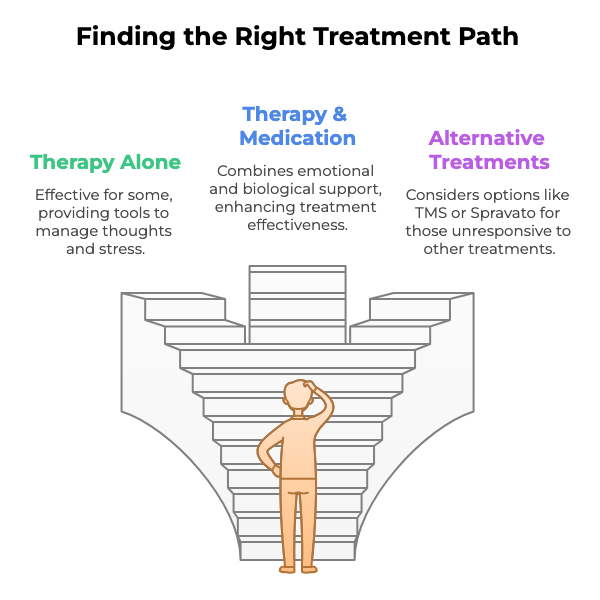Can Therapy Alone Help With Severe Depression?
If you are struggling with severe depression, a big question is if talk therapy alone can be enough to help you feel better. This is an important question, and the answer isn’t always simple. For some, therapy is enough to make meaningful progress. For others, it may not be enough on its own and is only part of the solution.
What Therapy Can Do
Talk therapy, such as cognitive behavioral therapy (CBT) or interpersonal therapy, can be very powerful. It gives people the tools they need to manage depression by understanding their thoughts, patterns, habits, and reactions. Working with a therapist allows you to speak openly about your pain and how to manage it. Therapy can:
- Help you notice harmful thinking patterns
- Teach you better ways to respond to stress
- Build a healthier and more stable daily routine
- Give you a judgment-free space to speak freely
Many people find talk therapy offers major relief. It allows them to manage their symptoms and begin to feel more like themselves again. But not everyone responds in the same way.
When Therapy May Not Be Enough
If you suffer from severe depression, it’s very different from stress or just having a few tough weeks. It affects your body’s ability to function. You may feel hopeless, empty, or like you are just going through the motions. If you are in talk therapy you may not feel like you are getting any better, or that your symptoms keep coming back. It’s not your fault and you’re not alone.
For some people, talk therapy alone is not enough. This does not mean therapy isn’t working, but it means your depression may have other causes that therapy can’t treat on its own. Severe depression often has biological roots. It usually involves changes in brain chemistry, genetics, stress hormone levels, or how certain brain circuits work. These changes make symptoms harder to manage through just talk therapy alone. Talk therapy can still help with the emotional or behavioral side, but it won’t be able to fully address what’s happening below the surface.
Other Treatment Options
If therapy has not been enough to help your depression, many people will take antidepressants alongside talk therapy. These medications can help depression by influencing neurotransmitters in the brain, such as serotonin, norepinephrine, and dopamine.
But if you have tried oral antidepressants without noticing changes, there are still other options. There are two FDA-approved treatments for more difficult-to-treat depression.
- Transcranial Magnetic Stimulation (TMS): A non-invasive treatment that uses magnetic pulses to stimulate specific areas of the brain linked to mood.
- Spravato (esketamine): A nasal spray administered under medical supervision. It is designed to treat depression that hasn’t responded to other medications and often offers relief faster.

When To Rethink Your Treatment Plan
If you have been in talk therapy for a while and haven’t noticed improvements, don’t give up. All it means is that it’s time to reassess and try to find something that fits better. Watch for these signs that talk therapy alone is not enough for you.
- You feel worse, not better
- You lost motivation to go to therapy
- Everyday tasks feel impossible
- You are feeling numb, not just sad
- You are having a hard time eating or sleeping
- your thoughts are getting darker
If any of these sound familiar, talk to your provider. Your brain may just need more support than therapy can give you alone. There are more tools out there that offer the support and treatment you need.
Everyone’s Path Is Different
It’s important to remember that there is no one right way to treat depression. Some people may improve with just talk therapy alone, others may need a mix of therapy and medication, while others need newer approaches like TMS or Spravato.
What matters is paying attention to how you are feeling. If your treatment is not working, remember that changing your plan is possible. Don’t be scared to re-evaluate your treatment plan. Don’t feel like you have to “wait it out” or “push through” if something is not working. There are other options, you just need to find what works for you.
What You Can Do Next
Start by checking in with your doctor and let them know how you are feeling. Discuss whether you think your current plan is enough. If you aren’t in treatment yet, that’s okay too. You can start with therapy and see how it goes. But keep in mind, if things don’t improve, there are other options. If you want to learn more about innovative treatments like TMS or Spravato visit MDDCare.com and find a clinic near you.
